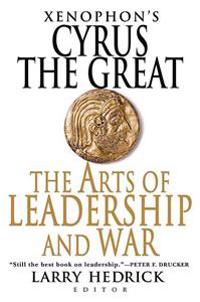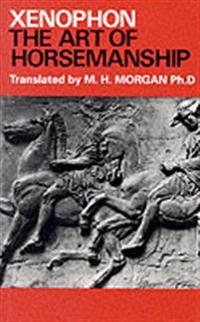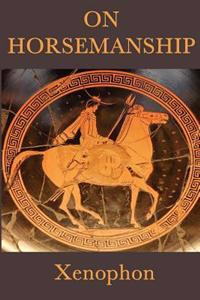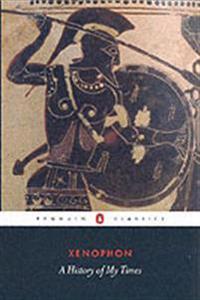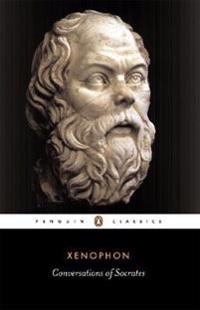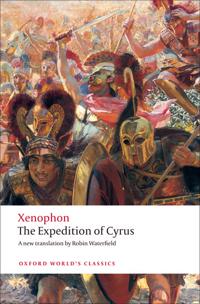Xenophon's Cyrus the Great (Pocket)
avXenophon, Larry Hedrick, Xenophon
ISBN: 9780312364694 - UTGIVEN: 200704A modern, accessible translation of the ancient Athenian's account of Cyrus the Great's military campaign discusses his founding of the Persian empire, rescue of some 40,000 Jewish captives, and benevolent leadership style that won the respect of his enemies, in a volume that also reveals how today'[...]
Xenophon Constitution of the Athenians (Pocket)
avXenophon, Mark Joyal, Xenophon
ISBN: 9780929524955 - UTGIVEN: 2002-01The Landmark Xenophon's Hellenika (Inbunden)
avXenophon, Robert B. Strassler
ISBN: 9780375422553 - UTGIVEN: 200911Xenophon's Anabasis of Cyrus. with Notes by R. W. Taylor. (Häftad)
avXenophon
ISBN: 9781241453329 - UTGIVEN: 2011-03Title: Xenophon's Anabasis of Cyrus. ... With ... notes ... by R. W. Taylor. Gr.Publisher: British Library, Historical Print EditionsThe British Library is the national library of the United Kingdom. It is one of the world's largest research libraries holding over 150 million items in all known lang[...]
The Art of Horsemanship (Pocket)
avXenophon, Xenophon, Morris H. (TRN) Morgan, Xenophon
ISBN: 9780851310411 - UTGIVEN: 1999-08Xenophon's "The Art of Horsemanship" is the earliest known work on the horse and how to ride it. Though Xenophon wrote his treatise twenty-three centuries ago, it still provides the modern-day equestrian enthusiast with much food for thought and is delightfully easy to read. In this translation by M[...]
Opera Omnia (Inbunden)
avXenophon, E. C. (EDT) Marchant, Xenophon
ISBN: 9780198145523 - UTGIVEN: 1922-02Xenophon I. Historia Graeca
The Art of Horsemanship (Pocket)
avXenophon, Morris H. Morgan, Xenophon
ISBN: 9780486447537 - UTGIVEN: 200603The Persian Expedition (Storpocket)
avXenophon
ISBN: 9780140440072 - UTGIVEN: 1975-06In "The Persian Expedition", Xenophon, a young Athenian noble who sought his destiny abroad, provides an enthralling eyewitness account of the attempt by a Greek mercenary army - the Ten Thousand - to help Prince Cyrus overthrow his brother and take the Persian throne. When the Greeks were then betr[...]
A History of My Times (Pocket)
avXenophon, Rex Warner, George Cawkwell
ISBN: 9780140441758 - UTGIVEN: 1979-05Xenophon's "History" recounts nearly fifty turbulent years of warfare in Greece between 411 and 362 BC. Continuing the story of the Peloponnesian War at the point where Thucydides finished his magisterial history, this is a fascinating chronicle of the conflicts that ultimately led to the decline of[...]
Conversations of Socrates (Storpocket)
avXenophon
ISBN: 9780140445176 - UTGIVEN: 199002After the execution of Socrates in 399 BC, a number of his followers wrote dialogues featuring him as the protagonist and, in so doing, transformed the great philosopher into a legendary figure. Xenophon's portrait is the only one other than Plato's to survive, and while it offers a very personal in[...]
Xenophon's Anabasis, Or The Expedition Of Cyrus (Pocket)
avMichael A. Flower
ISBN: 9780195188684 - UTGIVEN: 2012-09-07Xenophon's Anabasis, or The Expedition of Cyrus, is one of the most famous survival stories ever written and the most important autobiographical work to have survived from ancient Greece. This book places the Anabasis in its historical and literary context and opens up for the reader different ways [...]
Xenophon's "Cyropaedia"
ISBN: 9780198144779 - UTGIVEN: 1993-06This book is a literary study of the Cyropaedia, Xenophon's fictional account of Cyrus the Great and the founding of his empire. The Cyropaedia is a complex blend of various literary forms, and this book examines several of its literary genres. General discussions of the works of Xenophon's predec[...]
The Expedition of Cyrus (Häftad)
avXenophon
ISBN: 9780199555987 - UTGIVEN: 200908'Men, the enemy troops you can see are all that stands between us and the place we have for so long been determined to reach. We must find a way to eat them alive!' The Expedition of Cyrus tells the story of the march of the Ten Thousand. The exploits of this famous army of Greek mercenaries in [...]
LSD, Marihuana, Yoga, and Hypnosis (Häftad)
avTheodore Xenophon Barber
ISBN: 9780202361444 - UTGIVEN: 2007-12The practice of yoga, hypnosis, and the use of psychedelic drugs to alter psychological and physiological states is not unknown to the study of psychology. They have been called "soft" studies and labeled unimportant. This is mostly because they are difficult to study and understand, often focusing [...]
Aristotle and Xenophon on Democracy and Oligarchy (Övrig)
avJ.M. Moore
ISBN: 9780520266056 - UTGIVEN: 2010-04-07This collection contains: Aristotle's "The Constitution of Athens"; Xenophon's "The Politeia of the Spartans"; "The Constitution of the Athenians" ascribed to Xenophon the Orator; and, "The Boeotian Constitution" from the Oxyrhynchus Historian. In bringing together, translating, and annotating these[...]
XENOPHON'S RETREAT (Häftad)
avRobin Waterfield
ISBN: 9780571223848 - UTGIVEN: 2007-09It is 401 BC. After an epic battle in Persia, Xenophon is elected general of the defeated Greek army and must lead the men on a fraught journey back home - a journey of hundreds of miles, north from modern-day Iraq into the mountains of Kurdistan and Armenia, and down to the coast of the Black Sea, [...]
Xenophon's Retreat: Greece, Persia, and the End of the Golden Age (häftad)
ISBN: 9780674030732 - UTGIVEN: 2008-10In "The Expedition of Cyrus," the Western world's first eyewitness account of a military campaign, Xenophon told how, in 401 B.C., a band of unruly Greek mercenaries traveled east to fight for the Persian prince Cyrus the Younger in his attempt to wrest the throne of the mighty Persian empire from h[...]
CYROPAEDIA (Inbunden)
avXenophon
ISBN: 9780674990579 - UTGIVEN: 1914-12Xenophon (ca. 430 to ca. 354 BCE) was a wealthy Athenian and friend of Socrates. He left Athens in 401 and joined an expedition including ten thousand Greeks led by the Persian governor Cyrus against the Persian king. After the defeat of Cyrus, it fell to Xenophon to lead the Greeks from the gates o[...]
Xenophon
ISBN: 9780674990586 - UTGIVEN: 1952-06Cyropaedia by Xenophon (c. 430 c. 354 BCE) is a historical romance on the education of the sixth century BCE Persian king Cyrus the Elder that reflects Xenophon s ideas about rulers and government.[...]
Hellenica (Inbunden)
avXenophon
ISBN: 9780674990982 - UTGIVEN: 196012Xenophon (ca. 430 to ca. 354 BCE) was a wealthy Athenian and friend of Socrates. He left Athens in 401 and joined an expedition including ten thousand Greeks led by the Persian governor Cyrus against the Persian king. After the defeat of Cyrus, it fell to Xenophon to lead the Greeks from the gates o[...]
Hellenica (Inbunden)
avXenophon
ISBN: 9780674990999 - UTGIVEN: 198907Xenophon (ca. 430 to ca. 354 BCE) was a wealthy Athenian and friend of Socrates. He left Athens in 401 and joined an expedition including ten thousand Greeks led by the Persian governor Cyrus against the Persian king. After the defeat of Cyrus, it fell to Xenophon to lead the Greeks from the gates o[...]
Anabasis (Häftad)
avXenophon
ISBN: 9780674991019 - UTGIVEN: 198907Xenophon (ca. 430 to ca. 354 BCE) was a wealthy Athenian and friend of Socrates. He left Athens in 401 and joined an expedition including ten thousand Greeks led by the Persian governor Cyrus against the Persian king. After the defeat of Cyrus, it fell to Xenophon to lead the Greeks from the gates o[...]

